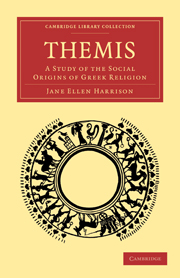Book contents
- Frontmatter
- PREFACE TO THE SECOND EDITION
- INTRODUCTION
- Contents
- ADDENDA ET CORRIGENDA
- CHAPTER I THE HYMN OF THE KOURETES
- CHAPTER II THE DITHYRAMB, THE Δρώμενον AND THE DRAMA
- CHAPTER III THE KOURETES, THE THUNDER-RITES AND MANA
- CHAPTER IV MAGIC
- CHAPTER V TOTEMISM, SACRAMENT AND SACRIFICE
- CHAPTER VI THE DITHYRAMB, THE SPRING FESTIVAL AND THE HAGIA TRIADA SARCOPHAGOS
- CHAPTER VII THE ORIGIN OF THE OLYMPIC GAMES
- CHAPTER VIII DAIMON AND HERO
- CHAPTER IX FROM DAIMON TO OLYMPIAN
- CHAPTER X THE OLYMPIANS
- CHAPTER XI THEMIS
- INDEX
- Frontmatter
- PREFACE TO THE SECOND EDITION
- INTRODUCTION
- Contents
- ADDENDA ET CORRIGENDA
- CHAPTER I THE HYMN OF THE KOURETES
- CHAPTER II THE DITHYRAMB, THE Δρώμενον AND THE DRAMA
- CHAPTER III THE KOURETES, THE THUNDER-RITES AND MANA
- CHAPTER IV MAGIC
- CHAPTER V TOTEMISM, SACRAMENT AND SACRIFICE
- CHAPTER VI THE DITHYRAMB, THE SPRING FESTIVAL AND THE HAGIA TRIADA SARCOPHAGOS
- CHAPTER VII THE ORIGIN OF THE OLYMPIC GAMES
- CHAPTER VIII DAIMON AND HERO
- CHAPTER IX FROM DAIMON TO OLYMPIAN
- CHAPTER X THE OLYMPIANS
- CHAPTER XI THEMIS
- INDEX
Summary
The title of this book and its relation to my Prolegomena may call for a word of explanation.
In the Prolegomena I was chiefly concerned to show that the religion of Homer was no more primitive than his language. The Olympian gods—that is, the anthropomorphic gods of Homer and Pheidias and the mythographers—seemed to me like a bouquet of cut-flowers whose bloom is brief, because they have been severed from their roots. To find those roots we must burrow deep into a lower stratum of thought, into those chthonic cults which underlay their life and from which sprang all their brilliant blossoming.
So swift has been the advance in science or rather in historical imagination, so complete the shift of standpoint, that it has become difficult to conceive that, in 1903, any such protest was needed. Since the appearance of Professor Murray's Rise of the Greek Epic we realize how late and how enlightened was the compromise represented by these Olympians. We can even picture to ourselves the process by which their divinity was shorn of each and every ‘mystical or monstrous’ attribute.
When in 1907 a second edition of my book was called for, its theories seemed to me already belated. My sense of the superficiality of Homer's gods had deepened to a conviction that these Olympians were not only non-primitive, but positively in a sense non-religious.
- Type
- Chapter
- Information
- ThemisA Study of the Social Origins of Greek Religion, pp. xi - xxviPublisher: Cambridge University PressPrint publication year: 2010First published in: 1912

